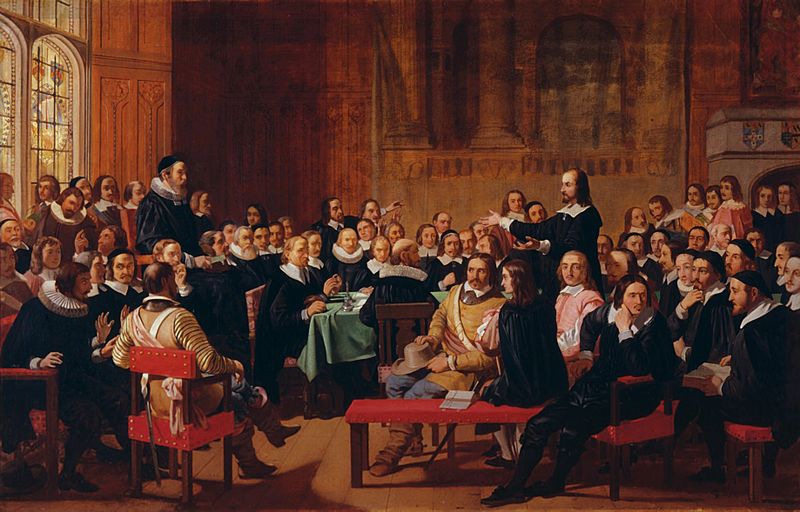Three earlier articles dealt with the development and meaning of the Nicene/Constantinopolitan Creed, usually simply called the Nicene Creed, and the later explication of the dual divine and human natures of Christ by the Council of Chalcedon in A.D. 451, based on presentations at the Prince George’s Conference on Reformed Theology on Sept. 23-24. Panelists followed this with a discussion of the use and meaning of the creeds today, and a presentation on the uses, abuses, and limits of creeds by J.V. Fesko, who introduced the conference.
The abuse of Creeds
Fesko observed that “up until World War I, the most destructive conflict in all of world history was the Thirty Years’ War which was fought from 1618 to 1648 … essentially, there were eight million people that were killed in the Thirty Years’ War. One third of the pre-war German population perished.” This was, particularly in its beginning, a religious war between Protestants and Catholics. Similarly, the English Civil War, which killed a quarter of a million people, was fought near the end of the Thirty Years’ War between royalists and parliamentarians but was really a conflict between Anglicans and Puritans. While the doctrinal disagreements that these wars were fought over are important, they were not worthy of bloodshed, Fesko said.
One common modern reaction to the religious wars, however, has been to “throw out dogmas.” While this is wrong, it is sometimes “only the children and grandchildren” who can see the wrongs of the past. We must avoid bloodshed over religious conflict, Fesko insisted. He noted that John Locke witnessed the execution of King Charles I of England, and this may have moved him, along with the religious conflict of the day, to pen the Letter Concerning Toleration. Locke said that the individual, not the church, must decide what he or she believes.
While orthodox Christians may disagree with this, we can agree that it is not the function of the state to prescribe religious doctrine. In line with this, the Presbyterian Church, acting shortly after the ratification of the United States Constitution, removed “key provisions” which said that “it was the civil magistrate’s responsibility to enforce doctrinal orthodoxy.” It is instead “the responsibility of the church.” Excommunication for heresy is entirely proper, Fesko said, but the government should not say “we believe that you are in doctrinal error, therefore we will imprison you. And not only imprison you but put you to death.”
Modern Christians need to remember that they too are sinners. We do not know how we would have acted in these past situations, nor can we assume that we are not complicit in sin today. Nevertheless, we can only proceed in the light of Scripture, and as noted in the first article in this series, to have a gospel it is necessary to have a summation of the message of Scripture. This the creeds of the patristic era give us. Fesko cited the maxim “abuse does not destroy use.” He then went on to discuss the “legitimate Biblical use for creeds.”
The use of creeds for the Christian Church
He began by appealing to Eph. 4:11-13:
“And He gave some as apostles, some as prophets, some as evangelists, some aspastors and teachers, for the equipping of the saints for the work of ministry, for the building up of the body of Christ; until we all attain to the unity of the faith, and of the knowledge of the Son of God, to a mature man, to the measure of the stature which belongs to the fullness of Christ.”
Following the ascension of Christ, “he poured out the Spirit upon the church” to empower the saints with gifts. Fesko said that important features of the gifts of the Spirit were “unity, catholicity, and worship.”
The unity which is given is a unity of faith, of what is believed, and this is objectively identified with the help of the creeds. He observed that there are 45,000 denominations in the world. But most of these denominations agree on the creeds. Additionally, while the historic Protestant confessions disagree at points, “there are also massive areas of fundamental agreement between them.” He pointed to the doctrines of God, the Trinity, and salvation through Christ alone as important areas of agreement. There is a consistency of the gospel “across the ages.”
Regarding catholicity, Fesko said that the offices of “pastors and teachers” should be understood to be not only those who are alive and ministering today, but also those who have been pastors and teachers “throughout the ages.” But many of the gifts from the past remain “unopened” by ordinary Christians today, he said. Their writings constitute an enormous body of literature, and while we can’t read it all, or indeed in our world, a large part of it, they all agreed on the creeds, which are “truth laden.” He quoted the Dutch Reformed theologian Herman Bavinck to say that “Irenaeus, Augustine, and Thomas Aquinas do not belong exclusively to Rome, they are fathers and doctors to whom the whole Christian church has obligation.”
Thirdly, “the stature which belongs to the fullness of Christ” involves worship. Fesko said that “unity and catholicity are ultimately aimed at the worship of God.” Unity is necessary for worship because believers worship as a body. He observed that the lack of a set liturgy or the use of creeds, which is a common case with Evangelical churches, makes worship, and indeed, this writer would add, the content of the gospel itself, much more “inaccessible” to children. It might be observed that old gospel hymns are no longer sung in much contemporary Evangelical worship, and that this has been the case since the late twentieth century. Children and young people today have never heard the songs which are very familiar to older believers. Fesko said that “when a child can hear on a regular and consistent basis the Apostles’ Creed, the child can join in with the saints, and they can profess the faith once delivered to the saints.” He or she knows that the faith they are confessing goes back to the early church, and ultimately to the apostles. “The creeds and confessions … bind us together in worship.”
Limitations on creeds
Finally, Fesko considered the limits of the use of creeds. He said, quoting Samuel Miller, a nineteenth century theologian, that no one regards the creeds as having authority “equal to, or greater than, Scripture.” Protestant confessions certainly have held themselves to be below the authority of Scripture, although based on it. The Westminster Confession identifies the final authority as “the Holy Spirit speaking in Scripture.” We should keep “creed and confession in one hand, but Scripture in the other, and Scripture always takes the lead.”
There is also a danger in believing that reliance on a creed or confession “will preserve the church’s orthodoxy.” A particular problem, in the contemporary environment of intense cultural struggle, is to rely on correct answers to one or two “hot-button” issues to establish an individual’s orthodoxy, rather than a more wide-ranging assessment of their beliefs, justified from Scripture. Particularly in the era of post-modernism, in which people redefine things they don’t like to suit their own preferences, one needs to know what is meant by an affirmation of Christian belief. There is no formulaic way protect the church from faithlessness. It is Jesus Christ, not the creeds, Fesko said, who “protects the church.” Creeds and confessions “ultimately should point us to Christ at the head of the church.” We can only pray and worship Christ, relying on his protection.
Creeds are nonetheless valuable to “keep us on a path of orthodoxy, so that we are always faithful to our triune God.” But we must “put our trust and our confidence in Christ to preserve his church, not in our ability to remain faithful to our creeds and confessions.”
Questions regarding creeds
In a question and answer session reviewing the conference, it was asked why modern translations of the Bible render Jn. 3:16 as saying that Jesus is “the only Son,” or “the one and only Son” of God, rather than “the only begotten Son,” as the King James Version does, and which translation is more correct. Craig Carter, who spoke earlier, said that the implication of what was being asked is whether or not the doctrine of the eternal generation of the Son, held by the creeds, is supportable from Scripture. He said that this doctrine is not justified from a proof-text, but from the terms “Father” and “Son.” It is the nature of fathers to beget sons. It might be added that the Gospel of John says that the Son does what he sees the Father doing (Jn. 5:19). Carter added that Biblical scholars were once confident that Jn. 3:16 should be rendered as saying that the Son is “begotten” of the Father, then became convinced that it should not be so translated, and now are moving back to the view that the word “begotten” is proper in translating this Scripture.
It was also asked if denial of a particular doctrine in the creeds on the part of a Christian teacher puts him outside the bounds of orthodoxy, and thus he should be regarded as a heretic. Fesko said that since today we have many denominations, rather than one church, popular teachers cannot be held accountable as they would be in a single church. We do have the obligation, he said, to point out the deviation of an otherwise orthodox teacher on the particular point on which he is in error.
Another questioner asked if there are “rules for rightly interpreting the creeds.” Must we use historical grammatical interpretation, rather than critical interpretation, which would see the creeds as relative to the time in which they were written, and perhaps failing in their interpretation of Scripture at some point. Carter responded that “there is a qualitative difference between creed and Scripture.” Historical-critical interpretation often involves anti-supernatural assumptions and should not be used in interpreting Scripture. But we may consider whether or not historical circumstances adversely affected the faithfulness with which the creeds summarized Scripture, keeping in mind Carter’s earlier observation that individual interpretation is overwhelming unlikely to be correct against the wisdom of the historic church. Another panelist, Chris Spano, said that the critical methodology arising from the Enlightenment was intended to find one correct answer, based on reason alone, for the meaning of Biblical texts about which there had long been agreement. But with no authority other than reason, there is no final agreement on meaning.
It was also asked if the church today should be “updating the language of older creeds and confessions.” Carter said that creeds are what they are, they cannot be revised as such, although churches can have additional statements of faith. Fesko added an observation of J. Gresham Machen, that “we do not live in a creed making age.” He said that contemporary Christians, on the whole, are greatly ignorant of the Christian past. People simply don’t know Christian theology well enough to know if anything in the creeds should be added or taken away. Fesko does believe, however, “that we’re living at the beginning of a renaissance” in the understanding of classical Christian theology. Nevertheless, he did note that “every new creed or confession typically builds upon the [ancient] creeds.” This, he said, is true of the Protestant Reformation as well.
There was a question concerning whether Arianism is the same as the modalism which the United Pentecostal Church (i.e., “Jesus only Pentecostalism”) teaches. Spano said that modalism is not Arianism. One of Arius’ motivations was to refute modalism. Arianism is a subordinationist doctrine, which teaches that Jesus is ontologically different and inferior to God the Father, whereas modalism holds that God the Father and God the Son are different manifestations of a unitary deity.
Should analogies be used to make the Trinity more understandable? The panelists seemed to agree that analogies are not very helpful in making the Trinity comprehensible. Reasonably, they could lead to misunderstandings.
A final question asked if the Greek philosophy used to formulate the creeds is a corruption of revealed Biblical truth. Carter said that nineteenth century liberalism advanced “the Hellenization thesis.” It held that the earliest Christianity, which was focused on ethics, and saw Jesus as simply an ethical teacher, was corrupted by the importation of Greek ideas in the second and third centuries. But subsequent scholarship has largely set this aside. “It’s just not way it happened.” He said that “the phrase to remember is ‘critical appropriation.’” The early church fathers appropriated from Greek thought those concepts that best expressed what they read in Scripture. Spano added that Augustine was drawn to Christianity in part by his reading of Platonist philosophy.
This writer would remark that the dissolution of orthodoxy in part of Evangelicalism in the early twenty-first century has been surprising. What we commonly call “Evangelicalism” originated in an effort to preserve doctrinal orthodoxy as liberalization proceeded in the historic Protestant churches. As Fesko indicated, when people regularly hear and recite a creed, it constantly reinforces in their minds and the minds of their children what it in fact is that they and their church believe. Such an anchor is of crucial importance as the pace of change, accumulation of knowledge, and challenges to the gospel, both social and legal, accelerate in the world we live in.





Comment by Timothy W Whitaker on October 20, 2022 at 3:34 pm
This is an excellent article which gathers up key insights from the presenters that are crucial for the reformation of the churches in the present era. Now is the time to move beyond the bad habit in mainline Protestantism of neglecting or even denigrating creeds and doctrinal teaching necessary to equip Christians to live faithfully in the world. Especially we should heed the counsel for churches to recover a “set liturgy” and recitation of creeds because liturgy is the school of the church, and children love to participate in singing hymns, saying prayers, and reciting creeds.